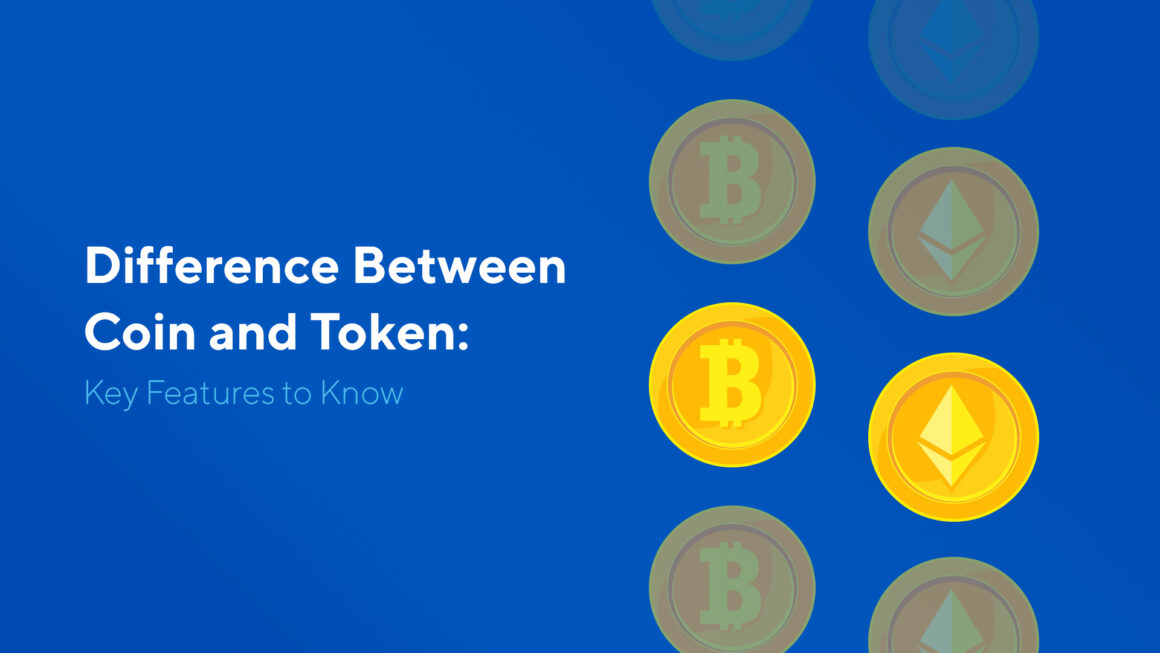Nowadays more and more people wonder ‘What is the difference between coin and token?’. Today, we’re about to find out! A token is a unit of account issued by an organization to present its digital balance.
This is a kind of substitute for securities in a web world. In addition, tokens are a necessary aspect of every ICO. In turn, ICO is a form of cryptocurrency crowdfunding, that is, attracting investments for the development of a project.
Management of this unit of account is most often carried out via a smart contract, which shows a balance in an account. It also transfers tokens from one account to another. Access to them is provided via special apps where they’re identified by electronic signature.
Seems quite clear, isn’t it? Anyway, what is the key difference between crypto coin and token? That’s the main issue of today’s article!
Difference Between Coin and Token in Cryptocurrency: What is Token?
Before answering ‘What is the difference between coin and token?’ question, let’s consider some technical aspects of a token. As was mentioned before, cryptocurrency tokens are certain assets, a kind of monetary counterpart, a value that reflects participation in a project, certificate of ownership, or any other significant aspects.
Sometimes they are used to finance a company, in turn, the use of other crypto tokens is a creation of a counterpart of shares. A parallel of this unit of account can be drawn with casino chips or points on a loyalty card — the principle of operation is similar.
What is ICO? ICO stands for Initial Coin Offering. The first token sale is raising funds via the implementation of an accounting unit created within an organization. It’s acquired to finance a company in order to receive dividends or other benefits in the future.
The launch of the first token sale is an opportunity for anyone who wants to invest their money in a startup with the prospect of making a profit. Unlike the classic IPO, the ownership of tokens doesn’t provide an opportunity to participate in the management of an organization (unless this is approved separately).
What are the Main Types of Tokens?
Before giving a clear answer on ‘What is the main difference between token and coin?’ question, let’s consider the main types of crypto tokens.
-
- Utility Tokens. These are tokens that provide an owner with an opportunity to purchase certain services of a company. They’re used to sponsor common infrastructure projects.
-
- Security Tokens. This type of accounting unit gives owners the right to exercise their investment interests. This right may be membership in an organization, capital, income; lender status, etc.
-
- Asset-backed Tokens. Tokens that guarantee owners an opportunity to purchase company products. An organization that issued such tokens ensures that they can be exchanged for goods or services.
Once you have found out a little bit more about a crypto token, let’s consider the key difference between coin and token in cryptocurrency.
Coin and Token Difference: A Complete Guide
Two types of digital currency — ERC-20 token and cryptocurrency — have significant differences.
So, what is the difference between a coin and a token? A token is a form of digital asset that sits on top of a blockchain. While cryptocurrency is a virtual tool that is encrypted using cryptography. Thus, this is a more generalized concept, which includes the definition above.
Tokens used in ICOs cannot be defined as cryptocurrency as they aren’t endowed with the appropriate qualities. Cryptocurrency is a means of payment within the blockchain, mining of coins is carried out via mining on special equipment. The issue of tokens in any desired quantity is on the project owner’s shoulders.
Important. There is a coin and the token difference in turnover as well. Tokens are created exclusively for movement within a company, while cryptocurrency is a public means of payment that is sold outside of individual organizations and is considered the basis of a web economy. A high-grade coin operates via a personal blockchain (distribution registry), on the basis of which it’s possible to issue tokens.
After a company has completed the ICO stage, that is, the funds received have increased and transferred to an exchange, tokens become cryptocurrency. This is due to the fact that now they can be used not only within a project, but also in an external environment. For example, they can be sold for another cryptocurrency or even for fiat money.
The initial currency offering is also called a crowdsale or token sale. The very first project in history using tokenization was Mastercoin, later renamed to Omni. This event occurred in the second half of 2013. Since then, the number of ICOs has increased significantly, and tokens have taken a place of a full-fledged element in the world of cryptocurrency society.
What other token and coin difference do you know? Just share your opinion in the comments!

Leave a Reply